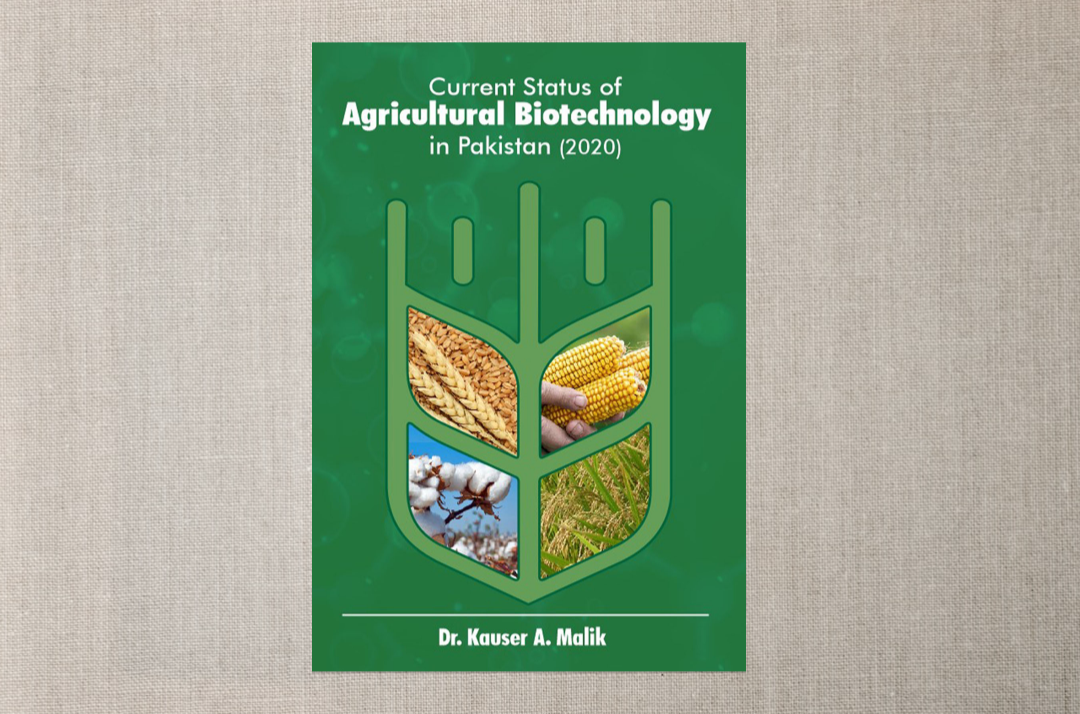
Food Security as Important as National Security: Punjab Agri Minister
March 17, 2021| |
Pakistan Biotechnology Information Center (PABIC) Lahore Chapter published the booklet Current Status of Agricultural Biotechnology in Pakistan written by Dr. Kauser Abdulla Malik, in collaboration with Forman Christian College University (FCCU). This booklet provides an overview of the development of biotechnology infrastructure and expertise in Pakistan and the current research details, the impediments for commercialization, and the laws and regulations governing this technology.
The booklet was launched virtually on March 11, 2021 and attended by scientists, policymakers, representatives from leading biotech institutes, academia, crop science industry, farmers, and other stakeholders.
"Pakistan has a longstanding policy to adopt biotechnology, reflected in the establishment and funding of numerous research institutes and academic programs across the country since 1994; however, a policy disconnect amongst relevant ministries and regulatory bodies continues to create roadblocks in the way of technology approvals." Dr. Kauser explained. Dr. Kauser is the Dean of Postgraduate Studies in FCCU and Director of PABIC.
The Chief Guest, Mr. Hussain Jahania Gardezi, Punjab Agriculture Minister, reinforced that biotechnology is a tool available to improve food security problems and reducing poverty. The application of biotechnology by Pakistani farmers would not only result in enhancing productivity but would also help in addressing food security challenges faced by the country.
"Food security is as important as national security. I believe that a bipartisan approach is required to ensure the continuity of the efforts and policies made to achieve these objectives." Minister stated.
He further promised that "We intend to further strengthen Punjab Agriculture Research Board so that it can support agricultural biotechnology project and facilitate in its commercialization. We intend to work with the Federal Government to strengthen and simplify the regulatory protocols so that the researches carried out can be commercialized."
Download a copy of the booklet from the Ministry of Foreign Affairs website.
| |
You might also like:
- Food Security Expert Says COVID-19 Pandemic Calls for Reassessment of Food Systems
- Pakistan's Agriculture Industry Remains Open for Biotech Opportunities
- Punjab Seed Council Approves New Bt Cotton Variety
Biotech Updates is a weekly newsletter of ISAAA, a not-for-profit organization. It is distributed for free to over 22,000 subscribers worldwide to inform them about the key developments in biosciences, especially in biotechnology. Your support will help us in our mission to feed the world with knowledge. You can help by donating as little as $10.
-
See more articles:
-
News from Around the World
- Gene Discovery to Help Peaches Adapt to Climate Change
- Study Shows Rising Temperatures Hurt Rice Yields
- Bacterial Strains Isolated in International Space Station Could Help Grow Plants in Mars
- Experts Highlight Importance of Scicom and Farmer Adoption in Building Knowledge on Biotech
- Invasive Weed Extract Could Help Treat Cancer and Type 2 Diabetes
- Food Security as Important as National Security: Punjab Agri Minister
- New South Wales Lifts 18-year Ban on GM Crops
- Discovery Ends Long-Standing Photosynthesis Controversy
-
Research Highlights
- OsMBD707 Overexpression Leads to Changes in Rice Growth and Development
- Multiple Statistical Analyses Show Compositional Equivalence of Bt and non-Bt Rice Varieties
-
Plant
- ISAAA Webinar: Innovative Tools for Crop Breeding
-
Health
- Study Reveals SARS-CoV-2 Jumped from Bats to Humans without Much Change
-
Read the latest: - Biotech Updates (February 4, 2026)
- Gene Editing Supplement (January 28, 2026)
- Gene Drive Supplement (February 22, 2023)
-
Subscribe to BU: - Share
- Tweet

